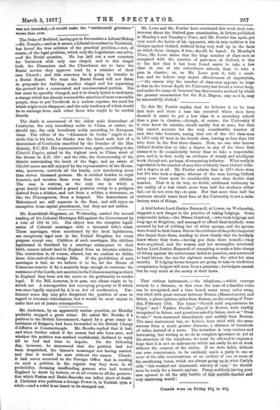To this Mr. Fowler replies that he believes it to
be true that here and there a case has occurred where men have deemed it easier to get a low class in a secondary school than a pass in classios,—though, of course, the University if it once knew its mistake, would rectify this at once, but that this cannot account for the very considerable number of men who take honours, seeing that out of the 311 class-men in 1875 only 67 were in the fourth class, leaving no less than 244 who were in the first three classes. Now, no one who knows Oxford doubts that to take a degree in any of the three first classes is to do considerably better than to take a respectable pass, and is, in fact, really an evidence of steady and intelligent work, though not, perhaps, of surpassing industry. What really is regrettable is the number of men who evidently leave Oxford with- out a degree at all. Mr. Fowler admits that in 1875 there were but 394 who took a degree, whereas of the men leaving Oxford every year there must be considerably more than double that number. That is in its way, no doubt, additional testimony to the reality of a test which more than half the students either fail—or do not even try—to pass. But that more than half the students should waste their time at the University is not a satis- factory state of things.


































 Previous page
Previous page